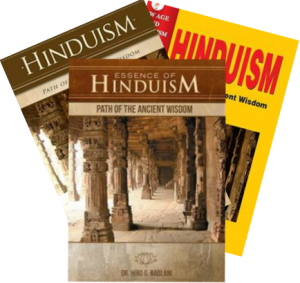In the Upanishads lies the key to unlock the spiritual wisdom of ancient Hinduism. The Brahman represents the essence of all cosmos, and the soul or atman projects the individual being. This teaching is punctuated with the refrain tat tvam asi, or “You are That.” In this equation, “you” means atman, and “That” means Brahman. The most intimate connection between the individual and the Divine has been pointed out.
In Prashna Upanishad: “May our ears hear the good. May our eyes see the good. May we serve Him with whole strength.”
The body and the senses are tools. Service is the purpose of life. We may not be able to fulfill our purpose if the tools are not in good shape.
Taittireeya Upanishad is also well known for the teacher/pupil relationship. The following is the convocation address to the student at the time of graduation:
“Do your duty. Speak the truth. Learn and teach. Control senses. Be hospitable. Be humane. Serve the family. Procreate. Educate your children. Austerity is necessary. Do not neglect your spiritual, nor your worldly welfare .Always learn and teach. Forget neither God, nor ancestor. Treat your mother as God. Treat your father as God. Treat your guest as God. Treat your teacher as God. Look for men greater than yourself, and welcome them. Give with faith. Give in proportion to your means. Give with courtesy. Give to the deserving.”
After five millennia, this address has not been bettered. Respect of elders, parents, guests, and teachers is noteworthy. They have been elevated to the status of God. So great has been the cultural impact of these teachings that in many homes even today, a person will not sit down in the presence of his or her parents or gurus until asked by them to do so. Noteworthy is the teaching, Do not neglect your spiritual, nor your worldly welfare.
Another spiritual gem of everyday life:
“Let there be no neglect of Truth. Let there be no neglect of dharma. Let there be no neglect of welfare. Let there be no neglect of prosperity. Let there be no neglect of study and teaching. Let there be no neglect of the duties toward the Gods and the ancestors.”
—Taittiriya Upanishad
Also in the Taittireeya Upanishad, this is written about food: “From food are born all creatures. They live upon food and in the end they become dissolved in food. Food is all things. Food is the medicine.”
Food is highly respected in Hindu society. No one would put his foot over the food grains; it would be considered most disrespectful.
About breath: “Gods, men, beasts, live by breath (prana).”
As long as man lives, he breathes. Hindus devised very special techniques for correct breathing. These techniques have been referred to in the Yoga Sutra as pranayama.
About knowledge: “Gods worship knowledge as the highest expression of spirit.”
Knowledge (spiritual knowledge-Jnana) is accorded the highest importance. One can gauge the advancement of civilization by this one parameter.
About hospitality: “Never turn anyone from your door; gather enough food, and say to the stranger Sir, the dinner is served.”
Even today, Indian hospitality is famous, despite the poverty and hardship of the present times.
From the Brihadaranyaka Upanishad:
“Lead me from the unreal to the real
Lead me from darkness to light
Lead me from death to immortality.”
This famous stanza of the Upanishads once again emphasizes the value of knowledge.
Swami Muktananda, a leading spiritual master of the twentieth century, who established many well-known centers in India as well as the United States, always emphasized that as human beings; we may attain the spirituality only through the body and senses. The body and senses thus need to be cared for and preserved. We need to use these in the right way to achieve union with God. If man becomes too old or too sick, his body and senses become dysfunctional, and he may no longer be able to contemplate, pray, and meditate.
These teachings of the ancient scriptures created deep impression on Hindu society. There are several stories and parables in ancient Hindu scriptures, which propagate various spiritual virtues. One such story narrates of a king, who had to cut and give away his entire body to protect a pigeon from a hawk, which was following it to secure its food. The king did so to keep his word of honor that he had given to the pigeon. Also this narration emphasizes the virtue of protecting the weak and vulnerable from the strong and finally the intervention of God to safeguard the virtuous as in this parable the gods descended to save the king in the end
Throughout the Hindu scriptures, “virtue of truth” has been hailed uppermost. In the annals of English judges and administration, during the British colonial power, one judge wrote, “I have had before me hundreds of cases in which a man’s property, liberty, or life depended on his telling a lie and he has refused to tell it.”
The Vedas and the Upanishads strongly emphasized on virtuous behavior. These verses serve as a constant reminder to mankind to live a life of truth and morality, to perform his/her duties candidly, and to neglect neither spiritual virtues nor the worldly responsibilities.
NOTE: All quotes of the Slokas are from: Max F. Muller. The Upanishads. New York: Dover Publications, 1984.




